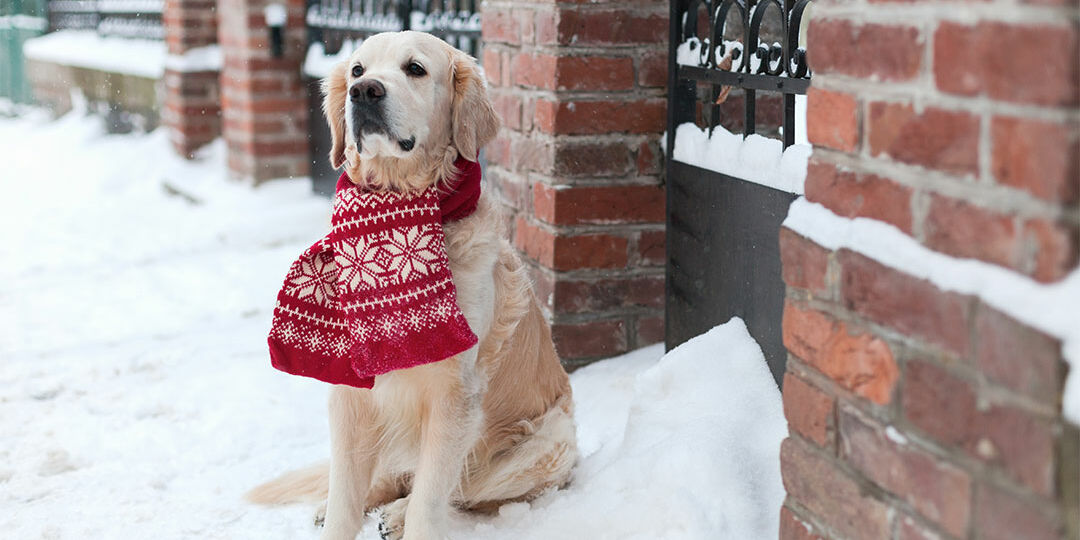
As winter blankets the world in snow and ice, it’s not just humans who need to bundle up and stay cozy. Our fur babies also require special attention to ensure they stay safe and warm during the cold months. Just like us, pets can be susceptible to the harsh effects of winter weather. To keep your four-legged friends happy and healthy, here’s a comprehensive guide to cold-weather safety for pets.
1. bundle up
While some pets are naturally equipped to handle colder temperatures, others, especially smaller breeds and those with short coats, may need a little extra help staying warm. Invest in pet-friendly sweaters, jackets, and boots to protect your furry friend from the cold. Not only do these accessories provide warmth, but they also add an adorable touch to your pet’s winter wardrobe.
2. create a cozy shelter
Ensure that your pets have a warm and dry place to seek refuge from the cold. Whether it’s a well-insulated doghouse or a cozy corner inside your home, a comfortable shelter is crucial during winter. Make sure bedding is dry and add extra blankets for warmth. For outdoor pets, consider adding a heated pad to their sleeping area to prevent them from getting too cold during the night.
3. limit outdoor time
While some dogs may frolic in the snow with boundless enthusiasm, it’s essential to monitor their time outdoors, especially during extreme cold weather. Limit exposure and bring them inside if temperatures drop too low. Prolonged exposure to cold weather can lead to frostbite and hypothermia, even in animals with thick fur.
4. check those paws
Salt and de-icing chemicals on sidewalks and roads can be harsh on your pet’s sensitive paw pads. After walks, wipe your pet’s paws with a damp cloth to remove any salt or chemicals. Consider investing in pet-safe ice melt for your own property to minimize your pet’s exposure to harmful substances. You can also apply pet-friendly paw balms or booties to provide an extra layer of protection.
5. hydration is key
It’s easy to forget about hydration during the winter, but it’s just as important as in the warmer months. Ensure that your pets have access to fresh and unfrozen water at all times. Hydration helps regulate body temperature and keeps your fur babies healthy and comfortable in the cold.
6. watch for signs of hypothermia
Pets, especially those with thinner coats, can be at risk of hypothermia in extremely cold weather. Watch for signs such as shivering, lethargy, and difficulty breathing. If you notice any of these symptoms, bring your pet indoors immediately and contact your veterinarian. Quick action is crucial when it comes to treating hypothermia.
7. maintain a consistent routine
Pets thrive on routine, and the winter months should be no exception. Stick to your regular walking and feeding schedule to provide a sense of stability for your fur babies. Consistency is particularly crucial during colder months, as it helps your pets adapt to the changing weather and reduces stress.
8. be mindful of antifreeze
Antifreeze is a common winter product that can be extremely toxic to pets. Keep it out of reach and clean up any spills immediately. The sweet taste of antifreeze is appealing to animals, but even a small amount can be fatal. Opt for pet-safe alternatives when possible and be vigilant about checking your car for leaks.
9. know your pet’s limits
Every pet is unique, and their ability to handle cold weather varies. Pay attention to your pet’s behavior and adjust your routine accordingly. If your pet seems uncomfortable or is reluctant to go outside, respect their limits and provide indoor activities to keep them engaged and active.
10. regular vet check ups
Winter is a great time to schedule a check-up with your veterinarian. Cold weather can exacerbate existing health issues, and a thorough examination ensures that your pet is in the best possible condition to face the challenges of winter. Discuss any concerns you have about your pet’s well-being during the colder months.
Don’t forget that winter time tends to be busier than usual for most shelters. This winter, think about taking in a rescue – here are some ways in which it may actual benefit you, as well as our furry friends.